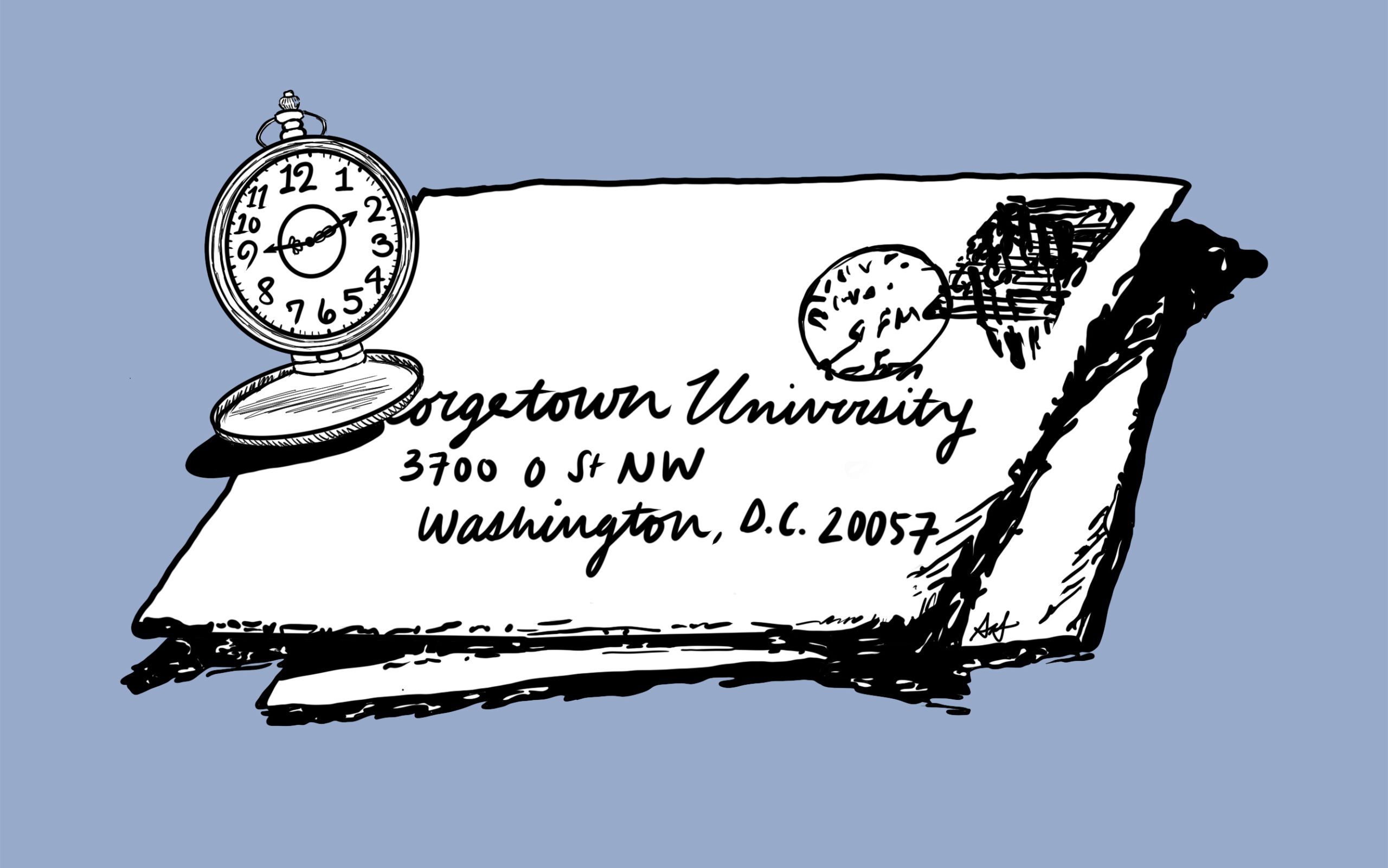In August of 2018, I moved across the country to start my freshman year of college. As our plane began its descent into Reagan airport, we passed glowing monuments—the smooth dome of the Jefferson, the sharp corners of the Lincoln, the tall obelisk of the Washington—and I felt an electric tingling in my stomach. I was leaving home to attend Georgetown, a four-year journey that I thought would be the best part of my life.
As a senior, I remember that moment with both fondness and melancholy. In truth, my college experience has not been the reverie that I imagined.
When prompted to reflect on my time at Georgetown, I immediately think about my most difficult moments here. There are many: late nights in dimly-lit Lau cubicles, being sent home during the pandemic, and the weeks when I felt so exhausted that I could barely get out of bed. I spent years constantly feeling overworked and yet still behind—feelings both created and compounded by Georgetown’s stress culture. On campus, I was overwhelmed by pressure to do more: take extra classes, get better grades, engage in research, join another club, apply for a leadership position, an internship, a job. After seeking help, my mental health has improved since those early years. But I can still remember the intensity of that sadness, and I don’t think I’ll ever disentangle Georgetown from the depression and anxiety that I experienced here.
My Georgetown experience has also been characterized by a pervasive feeling of loneliness. Attending this school is a privilege, and I recognize that my being here is a result of the advantages I’ve had in my life. But as a woman of color from the Bay Area, it has been extremely challenging to be in an environment where the majority of my peers are white, exceedingly affluent East-Coasters. In my eight semesters here, I’ve been in a group project with another WOC fewer than five times. It’s a startling statistic that, in and of itself, exemplifies how ubiquitous whiteness is at Georgetown. I’ve felt nervous and intimidated around many of my peers and am often confronted by casual racism—passing comments, raised eyebrows, poor intonation—from professors and classmates. I am never sure whether I should respond or let their comments go; both options leave me uncomfortable and disheartened.
This feeling of isolation was strongest in spring 2021, after the shooting of seven Asian women in Atlanta. I cried that day, both because I was afraid and because there were so few people that I felt comfortable turning to for support. For me, part of being a Georgetown student always includes the anticipated relief I’ll feel when I arrive back in Oakland—my home, a city with significantly more socioeconomic and racial diversity.
I can’t completely disparage my time in college, because good things have come out of my years here, too. I’ve worked with truly incredible faculty members, taken engaging classes, and traveled across the world to study. My Georgetown education will serve me long after graduation, and I am so grateful to have had access to this school’s resources.
Most importantly, I’ve made close friends and good memories here. I loved the weekend trip that my friends and I took during freshman year, when we piled into a minivan and drove to a cornflower-blue rental house in Chesapeake Beach. I can’t imagine junior spring without my quiet apartment in Glover Park, and I can’t picture senior year without Thursday dinners with my best friend. I’ve walked around all the monuments, visited the Smithsonians, danced at every formal I could get to, and stayed up talking and watching Jeopardy! with my housemates for more nights than I remember. Even when alone, I’ve enjoyed beautiful, quiet moments at Georgetown, too—like the way the sun makes Healy Hall glow in the early morning, the blooming tulips and cherry blossoms in the spring, and the yellow-orange-red foliage that dusts the streets in the fall.
In the last months, I’ve struggled with how to make sense of these two conflicting ideas: the Georgetown I’ve hated—that I’ve fought with and cried over and wanted to leave—and the snippets of Georgetown that I can write about so fondly. These memories are so radically different from one another that it sometimes feels like I attended two colleges. What does it mean to have these experiences coexist? Do they negate one another? Was Georgetown good, or was it bad?
These questions produce other feelings of guilt and sadness. My family has given so much—money, time, and emotional support—for me to attend this school. Having such a complicated relationship with college feels like a dismissal of their sacrifices. I also feel a profound sense of loss over not being able to enjoy Georgetown more. I know many people that love this school wholeheartedly, and it often feels like I missed out on something special. Like I was standing on the edge of a diving board, but was prevented from taking the plunge.
But maybe the answer is more complicated than that. I don’t know Georgetown without these moments of joy, and I don’t know Georgetown without these periods of deep sadness. After living through the intensity of both, it is hard for me to imagine what my life would look like without either. Maybe these memories can only be held alongside one another—not in dissonance, but as different pieces that make up my college experience.
Everyone says that these four years are supposed to be the best ones of your life. I don’t think they are mine (at least, I hope they aren’t), and as graduation approaches, I’m trying to grapple with my mixed feelings toward Georgetown without blaming or judging myself. College is an exciting, significant part of many people’s lives, but it is also extremely challenging. We shouldn’t need to love every part for it to provide meaning.
My time here has pushed me to grow, proved my resilience, and taught me about what I value in my life and relationships. To me, Georgetown was not the best. At times, it wasn’t even good. But being here has been memorable, formative, and life-changing. Perhaps that was what college was meant to be—for me. I hope that one day, I feel like that is enough.





